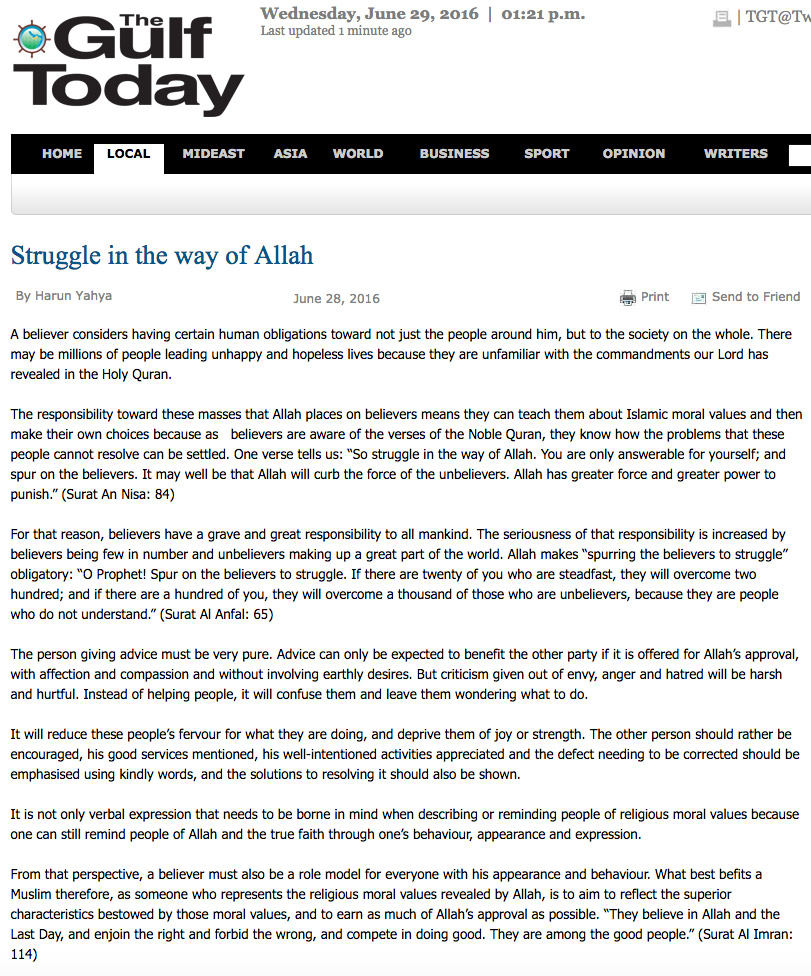
A BELIEVER considers having certain human obligations toward not just the people around him, but to the society on the whole.
That responsibility is instrumental in everyone living in the awareness of Islamic moral values. People are free to choose the lifestyle they like but since they are unacquainted with Allah and Islamic moral values, the majority may choose irreligion. Many of them may make mistakes or be unable to resolve their problems because they do not know religious moral values.
There may be millions of people leading unhappy and hopeless lives because they are unfamiliar with the commandments our Lord has revealed in the Qur’an. The responsibility toward these masses that Allah places on believers means they can teach them about Islamic moral values and then make their own choices because since believers are aware of the verses of the Qur’an, they know how the problems that these people cannot resolve can be settled. It is therefore a religious obligation for those who know to tell those who do not. One verse tells us: “So struggle in the way of Allah. You are only answerable for yourself; and spur on the believers. It may well be that Allah will curb the force of the unbelievers. Allah has greater force and greater power to punish.” (Surat an Nisa’, 84)
Being aware of the ways in which people can be rid of their troubles and yet deciding to keep these ways hidden and not tell anyone about them is like having prior knowledge of a disaster but not telling people
how to avoid it. If a disaster takes place and people die, then the person who never mentioned it has a heavy responsibility to bear.
For that reason, believers have a grave and great responsibility to all mankind. The seriousness of that responsibility is increased by believers being few in number and unbelievers making up a great part of the world. Allah makes “spurring the believers to fight” obligatory: “O Prophet! Spur on the believers to struggle. If there are twenty of you who are steadfast, they will overcome two hundred; and if there are a hundred of you, they will overcome a thousand of those who are unbelievers, because they are people who do not understand.” (Surat Al-Anfal, 65)
Spurring believers’ consciences
It is certain that in discharging their duty to preach the words, believers can make many errors and exhibit flaws stemming from ignorance or error. They may say a wrong thing, produce an incorrect interpretation, or do something wrong from an intention to do good. In that event, it is essential they be warned and learn the truth preaching the moral values of Islam and calling people to faith is a most important service calling for the greatest care; many people will decide whether or not to live by the moral values of Islam on the basis of the language, attitudes and behavior of the person describing them. If they love and trust the person describing religious moral values, then their hearts will begin warming toward the morals of Islam. That is why preaching a religious moral value is the most serious responsibility in the world. Therefore, believers who act with the aim of Islamic moral values becoming known to, and lived by, more people need to be warned and trained to address people better every day because such advice can overcome deficiencies in a person’s knowledge, manners, language, vocabulary, gestures, clothing and many other such matters and we thus obey Allah’s command regarding preparing believers. However, in the Qur’an Allah reveals that as we prepare believers, we must also encourage and enthuse them. That is why it is of the greatest importance for the advice to be given to be constructive, encouraging and respectful.
Believers must not be discouraged
The person giving advice must be very pure. Advice can only be expected to benefit the other party if it is offered for Allah’s approval, with affection and compassion and without involving earthly desires. But criticism given out of envy, anger and hatred will be harsh and hurtful. Instead of helping people, it will confuse them and leave them wondering what to do.
It will reduce these people’s fervor for what they are doing, and deprive them of joy or strength. The other person should rather be encouraged, his good services mentioned, his well-intentioned activities appreciated and the defect needing to be corrected should be emphasized using kindly words, and the solutions to resolving it should also be shown. A person who speaks incorrectly must be shown how he can speak properly, and if he uses inappropriate language he can be shown what kind of language he should be using.
Religion imposes a responsibility on the believers both to live virtuously and to remind people around them of those moral virtues. Yet it is not only verbal expression that needs to be borne in mind when describing or reminding people of religious moral values because one can still remind people of Allah and the true faith through one’s behavior, appearance and expression.
From that perspective, a believer must also be a role model for everyone with his appearance and behavior. What best befits a Muslim therefore, as someone who represents the religious moral values revealed by Allah, is to aim to reflect the superior characteristics bestowed by those moral values, and to earn as much of Allah’s approval as possible. “They believe in Allah and the Last Day, and enjoin the right and forbid the wrong, and compete in doing good. They are among the good people.” (Surat Al-Imran, 114)
There are various ways of preparing and encouraging believers. Encouraging someone to perform good works may perhaps lead us to enjoying the reward for that good work in the sight of Allah. Therefore, doing all we can to support believers and encouraging them to work harder and strive even further is an observance for which the believer will be rewarded in the Hereafter.
Adnan Oktar's piece on Arab News & The Gulf Today:



